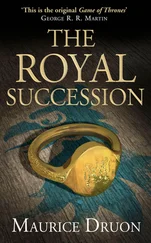In the month of January, 1329, Philippe VI made the County of Beaumont-le-Roger a peerage; at last Robert was a peer of France.
Since the King of England delayed coming to render homage, it was once again decided to seize the Duchy of Guyenne. But before the threat was put into execution, Robert of Artois was sent to Avignon to obtain the intervention of Pope John XXII.
Robert spent two delightful weeks on the banks of the Rhône. For Avignon, to which flowed all the gold of Christendom, had become, for anyone who enjoyed high living, gambling and beautiful courtesans, an enchanted city over which ruled an ascetic, octogenarian pope withdrawn into the problems of the Beatific Vision. The new peer of France had several audiences with the Holy Father; a banquet was given in the pontifical palace in his honour, and he enjoyed much learned conversation with a number of cardinals. Nevertheless, loyal to the avocations of his turbulent youth, he also frequented persons of more doubtful standing. Wherever Robert happened to be, he did not need to lift a finger to attract loose women, wicked men and fugitives from justice. If there was but one receiver of stolen goods in a town, in the first quarter of an hour Robert had found him out. The monk expelled from his order for causing scandal, the priest guilty of larceny or violating his oath, were inevitably to be found in his anteroom in search of his support. He was often saluted in the street by persons of sinister appearance and he would try vainly to recollect in what brothel of what town he had run across them. There was no doubt that he was trusted by the underworld, and the fact that he had become the second prince in the kingdom made no difference.
His old valet, Lormet le Dolois, was too old now to make long journeys and had not accompanied him to Avignon. But a younger man, Gillet de Nelle, who had been trained in the same school, was charged with Lormet’s duties. It was, indeed, Gillet who discovered for Monseigneur Robert a certain Maciot l’Allemant, a native of Arras and unemployed sergeant-at-arms, who would stick at nothing. Maciot had known Bishop Thierry d’Hirson well; and Bishop Thierry, during his last years, had had a mistress called Jeanne de Divion, who was at least twenty years younger than himself. She was complaining bitterly of the way Countess Mahaut had been treating her since the Bishop’s death. Would Monseigneur like to see this Dame de Divion?
Not for the first time, Robert of Artois concluded that there was much to be learned from people of bad reputation. No doubt there were safer hands than Sergeant Maciot’s into which to confide one’s purse, but the man clearly had much interesting information. Wearing a new suit of clothes and mounted on a good horse, he was sent north.
When he returned to Paris in March, Robert of Artois was in high good humour, prophesying that there would soon be interesting news in the kingdom. He mentioned that royal documents had been stolen by Bishop Thierry on Mahaut’s behalf. And a woman with veiled face came frequently to see him in his study where he held long and secret conferences with her. As the weeks went by, he seemed ever happier and more confident, and foretold the imminent confusion of his enemies with increasing assurance.
In the month of April the English Court, yielding to pressure from the Pope, sent Bishop Orleton to Paris once again, with a train of seventy-two persons, lords, prelates, lawyers, clerks and servants, to negotiate the form the homage was to take. Indeed, it was nothing less than a treaty which had to be agreed.
The affairs of England were not going too well. Lord Mortimer had not increased his prestige by compelling Parliament to sit under the menace of his troops. He had been forced to suppress an armed rebellion of the barons under the leadership of Henry Wryneck, Earl of Lancaster, and he was finding great difficulty in governing the country.
At the beginning of May, gallant old Gaucher de Châtillon died in his eightieth year. He had been born in the reign of Saint Louis, and had been Constable for twenty-seven years. His determined voice had often affected the results of battles and had frequently prevailed in the King’s Council.
On May 26th young King Edward III, having borrowed, as his father had done before him, five thousand livres from the Lombard bankers to cover the cost of the journey, took ship at Dover to come and render homage to his cousin of France.
Neither his mother Isabella nor Lord Mortimer accompanied him, for they were afraid the power might pass into other hands in their absence. The sixteen-year-old King, under the tutelage merely of two bishops, set out to confront the most imposing Court in the world.
For England was weak and divided, while France was a whole. There was no more puissant nation in Christendom; prosperous, populous, rich in industry and agriculture, governed by a powerful civil service and an active nobility, her lot seemed enviable indeed. While her makeshift king, who had now been reigning for a year during which he had achieved success after success, was the most envied of all the kings in the world.
5.
The Giant and the Mirrors

HE WANTED NOT ONLY to show himself off but to see himself too. He wanted his beautiful wife, the Countess, his three sons, Jean, Jacques and Robert, of whom the eldest, who was now eight, already gave promise of growing into a tall, strong man, to admire him; and he wanted his equerries and his servants, all the staff he had brought from Paris with him, to see him in his splendour. But he wanted also to be able to admire himself with his own eyes.
For this purpose, he had sent for all the mirrors that happened to be in the baggage of his suite, mirrors of polished silver, circular as plates, hand-mirrors, mirrors of glass backed by tin-foil and set in octagonal frames of silver-gilt, and he had had them hung side by side on the tapestry in his room. 7The Bishop of Amiens would no doubt be delighted to find his fine figured tapestry torn by nails. But what did that matter? A peer of France could permit himself that much. Monseigneur Robert of Artois, Lord of Conches and Count of Beaumont-le-Roger, wanted to see himself wearing his peer’s robes for the first time.
He turned first one way and then the other, advanced and retreated a couple of steps, but could see his reflection only in fragments, split up into pieces like a figure in a church window: on the left, the gold hilt of his long sword and, a little higher to the right, part of his chest where his silk surcoat showed his embroidered arms; here the shoulder to which the great peer’s mantle was fastened with a glittering clasp, and there, near the ground, the fringe of the long mantle falling on the gold spurs; and then, crowning it all, the great peer’s coronet with eight identical fleurons, set with the rubies he had bought at the late Queen Clémence’s sale.
‘Well, I’m worthily apparelled,’ he said. ‘It would be a great pity if I were not a peer, for the mantle suits me well.’
The Countess of Beaumont, also wearing state robes, did not altogether seem to share her husband’s satisfaction.
‘Are you quite sure, Robert,’ she asked anxiously, ‘that this woman will arrive in time?’
‘Of course, of course,’ he replied. ‘Even if she doesn’t come this morning, I shall make my claim, and present the papers tomorrow.’
The only drawback to Robert’s costume was the heat of early summer. He was sweating under the cloth-of-gold, the velvet and the thick silk, and though he had taken a hot bath that morning he was beginning to give off a smell like a wild beast.
Читать дальше













